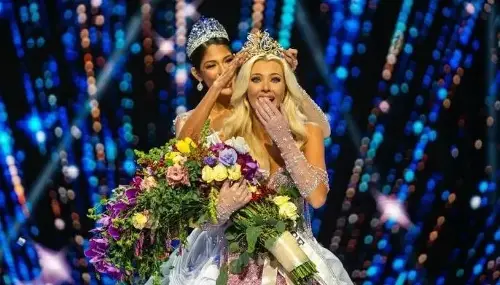
MANILA, Philippines — Victoria Kjaer Theilvig of Denmark bested 124 other delegates to be crowned the 73rd Miss Universe winner during the coronation night in Mexico on November 16 (November 17, Manila time). Outgoing queen Sheynnis Palacios Cornejo of Nicaragua relinquished her title to the Danish queen with Jewelmer's Lumiere de I'infini crown, the first Filipino-made Miss Universe crown.
This is the first time Denmark won the most coveted title, after a near-win by Danish delegate Aino Korva, who finished as 1st runner-up in 1963. This was the same year that the Philippines' very own Lalaine Bennett won as 3rd runner-up.
This is one of the rare times, in recent history, that the Top 2 remaining finalists did not come from powerhouse countries, with Denmark and Nigeria competing for the title.
Adetshina eventually settled for 1st runner-up, with Maria Fernanda Beltran (Mexico), Opal Suchata Chuangsri (Thailand), and Ileana Marquez (Venezuela) placing 2nd runner-up, 3rd runner-up and 4th runner-up, respectively.
Miss Universe also named four continental queens this year. They include the Philippines' Chelsea Manalo, who was named the first Miss Universe Asia. The other continental queens are Finland's Matilda Wirtavuori as the continental queen for Europe and Middle East, Peru's Tatiana Calmell as the continental queen for the Americas, and Nigeria's Chidimma Adetshina as the continental queen for Africa and Oceania.
Similar to one of the duties of the reigning Miss Universe, these queens will serve as ambassadors for the continents they received titles for.
The selection committee members composed of Lele Pons, Emilio Estefan, Miss Universe Canada 2020 Nova Stevens, Gary Nader, Camila Guiribitey, Eva Cavalli, Michael Cinco, Fariana, Jessica Carrillo, Gabriela Gonzalez, Gianluca Vacchi, and Miss Universe 1978 Margaret Gardiner chose eight finalists from the Americas (North & South), one from Africa, one from Asia, and two Europeans in the Top 12.
The five other delegates who were eliminated from the Top 12 were Juliana Gaidriki Barrientos (Bolivia), Ashley Callingbull (Canada), Magali Benejam (Argentina), Valentina Alekseeva (Russia), and Tatiana Calmell (Peru).
Like last year, the judges included in their selection candidates with unique stories such as Canada's first winner of indigenous race and Egypt's vitiligo condition. Had South Africa not withdrawn from the pageant, she would have also been recognized as her country's first delegate with hearing impairment.
The lucky ladies to have advanced to the semifinal round (Top 30) were indira Ampiot (France), Rhea Singha (India), Ivana Relic Trisic (Serbia), Ky Duyen Nguyen (Vietnam), Marianela Ancheta (Cuba), Jia Qi (China), Kaya Chakrabortty (Japan), Logina Salah (Egypt), Cassandra Chiu (Macau), Mara Topic (Ecuador), Sandra Lim (Malaysia), Anouk Eman (Aruba), Matilda Wirtavouri (Finland), Celinee Santos (Dominican Republic), Davin Prasath (Cambodia), Geysell Garcia (Nicaragua), Sakdile Dube (Zimbabwe), and Chelsea Manalo (Philippines).
Hosted by Mario Lopez and Miss Universe 2012 Olivia Culpo, with commentators Zuri Hall and Miss Universe 2018 Catriona Gray, the 73rd Miss Universe coronation rites was beamed to a global audience from the Arena Ciudad de Mexico and was streamed to a global audience via several platforms like Telemundo, Roku, and Youtube, as well as A2Z and Kapamilya channels nationwide.
